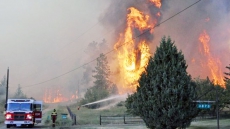OTTAWA — A spate of bomb threats against Canadian airlines over the summer exposed what one airport executive believed were shortcomings in how the industry and federal government share information about threats, newly released documents show.
The sentiment, expressed in an email from the head of the Winnipeg Airports Authority to Transport Canada's then-deputy minister, came after five bomb threats in six days against WestJet flights — all of which turned out to be hoaxes.
A copy of the message and other documents related to the bomb threats were released to The Canadian Press under the Access to Information Act.
Each incident, wrote authority head Barry Rempel, showed information sharing between the industry and federal agencies was "not timely nor sufficiently robust" for an effective response "and to track down the perpetrator(s)."
To date, no one has been charged in connection with the threats, which were made in late June and early July.
RCMP spokeswoman Sgt. Julie Gagnon said the force is still co-ordinating investigations by local and provincial forces.
WestJet spokesman Robert Palmer said the airline continues to work with authorities to find out who was behind the threats, which forced two flights to land early and put a scare into passengers during the summer travel season.
A Vancouver-Toronto flight had to land in Calgary on Canada Day, while a Halifax-Edmonton flight had to land in Saskatoon. Two other flights landed at their destinations in Victoria and Saskatoon after threats were called in.
In one case, six passengers received minor injuries after a bomb threat forced an Edmonton-Toronto WestJet flight to land in Winnipeg.
After the last threat on July 2, Transport Canada sent out a security reminder to airlines and airports about how they were supposed to handle bomb threats, given the increased frequency of such threats in Canada and the United States. The notice said airlines had to figure out if the threat was legitimate, and then decide with local police and, if necessary, Transport Canada how to deal with it.
In his email, Rempel wrote that Transport Canada and NORAD, among others, needed to be more involved each time a passenger plane was threatened.
"If airports or even other agencies are going to be receiving these calls, I believe they should all be treated as serious, but that people within the intelligence community are well positioned to assist," Rempel wrote in the July 2 email.
He argued the RCMP should take the lead on tracking down perpetrators, which it did after the fifth threat, and not let investigations drop, which usually "falls to the bottom of their daily priorities."
Rempel declined to comment on his message, sent in the early hours of July 2, nor on what movement — if any — there has been on his suggestions.
Transport Canada didn't say whether it has made or recommended any changes along the lines of what Rempel suggested. Spokeswoman Natasha Gauthier said the department works with police, airlines and airports "to resolve threat situations safely, efficiently, and with least possible impact to passengers and the aviation system."
Gauthier said any found responsible for the threats "will face the full force of the law."





